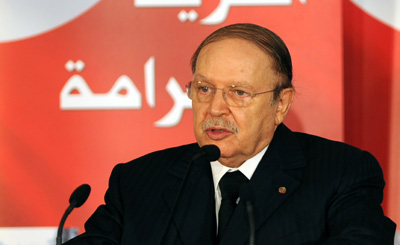New York, January 25, 2012–Algeria’s new media law falls short of President Abdelaziz Bouteflika’s promises of reform and also fails to meet international standards for freedom of expression, the Committee to Protect Journalists said today.
The Algerian government has touted the media law, which went into effect on January 12, as a major step in the advancement of press freedom in the country, but local journalists and civil society activists believe it is still restrictive and are calling for its revision, news reports said. The new law, which replaces the country’s restrictive 1990 media law, was passed in December after Bouteflika pledged media reform in April.
Of the law’s 133 articles, at least 32 can be used to restrict coverage by stifling free expression, CPJ research shows. Several of the provisions are ambiguous and impose undue restrictions on access to information as well as heavy fines for violations of the law. Journalists are subject to fines of up to 500,000 Algerian dinars (US$6,706) and potential publication closures for defamation and other violations including publishing information on a preliminary criminal investigation and insulting a foreign head of state or diplomat, CPJ research shows. Under the 1990 law, journalists were punished with up to 10 years’ imprisonment for insulting or defaming the state.
Local journalists told CPJ that although the new law was a step in the right direction, it offered only cosmetic changes. Kamel Amarni, the secretary general of the Algerian National Syndicate of Journalists, said that even though the law contained some “positive clauses … it is overall quite restrictive and does not advance press freedom in Algeria but restricts it.”
“The government has not honored its pledge to introduce a press law that would expand the margin for expression and liberalize the media landscape,” said Mohamed Abdel Dayem, CPJ’s Middle East and North Africa program coordinator. “The new media law should be revised by the government, and the restrictive clauses should be amended to guarantee press freedom.”
The ambiguity created by vaguely defined terms under the new law can subject journalists and bloggers to unnecessary restrictions. “Media” is defined as any publication, broadcast, opinion letter, or idea expressed by any written, audio-visual, or electronic means, CPJ research shows. The law also says that media personnel can operate freely but must respect the “Islamic faith and all religions,” “national identity and cultural values of society,” “national sovereignty and unity,” “requirements of state security and defense,” “requirements of public order,” and “economic interests,” among other broadly defined terms.
The new law also places undue restrictions on media ownership and management, stating that any director of a periodical publication must have at least 10 years of media experience in periodical publications, which was not required under the country’s 1990 law. In addition, the new law still considers off-limits the vaguely defined areas included in the old law, among them “news [negatively] affecting foreign policy and economic interests” and “investigative and judicial secrets,” CPJ research shows.
Although the new legislation passed with a majority vote in both houses, members of the lower chamber of parliament from the opposition Al-Nahda party walked out in protest, according to news reports. A group of journalists also staged a protest outside parliament on voting day, calling for a reconsideration of the law, Al-Jazeera reported.
